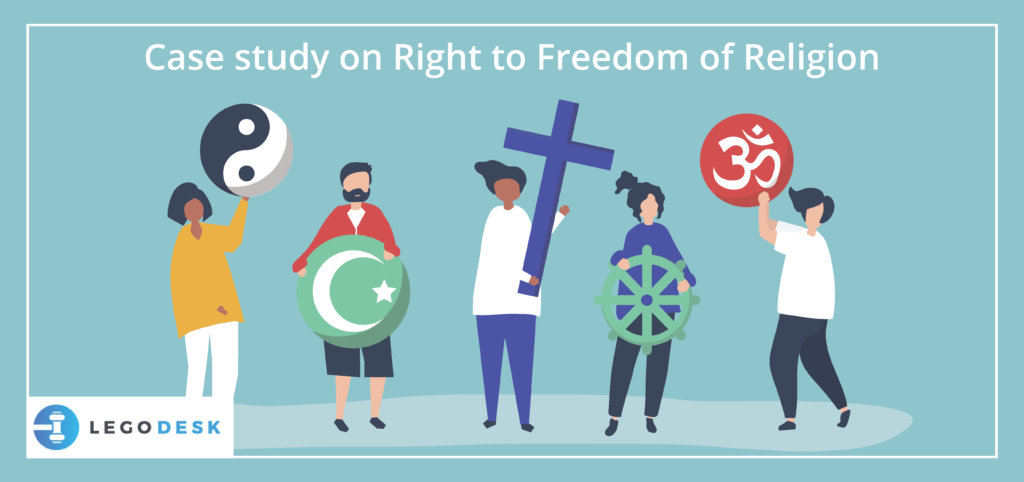Case study on Right to freedom of Religion

Right to freedom of religion (Article 25 To 28)
The right to freedom of religion is covered under Article 25 to Article 28 of the Constitution of India. The articles are focused on the securing of secularism within the constitutional framework of India, as heralded by the Preamble.
The relevant provisions concerning the right to freedom of religion are as hereunder reproduced:
- Article 25: Freedom of conscience and free profession, practise, and propagation of religion
- Article 26: Freedom to manage religious affairs
- Article 27: Freedom as to payment of taxes for the promotion of any particular religion
- Article 28: Freedom as to attendance at religious instruction or religious worship in a certain educational institution
Read Also: Freedom of Speech and Expression
Article 25 – Right to freedom of conscience and practice
Verbatim reproduction of the provision for a better contextual understanding of the right to freedom of religion is as hereunder:
(1) Subject to public order, morality, health, and the other provisions of this Part, all persons are equally entitled to freedom of conscience and the right freely to profess, practice, and propagate religion.
(2) Nothing in this article shall affect the operation of any existing law or prevent the State from making any law –
(a) regulating or restricting any economic, financial, political, or other secular activity which may be associated with religious practice;
(b) providing for social welfare and reform or the throwing open of Hindu religious institutions of a public character to all classes and sections of Hindus.
Explanation I. – The wearing and carrying of kirpans shall be deemed to be included in the profession of the Sikh religion.
Explanation II. – In sub-clause (b) of clause (2), the reference to Hindus shall be construed as including a reference to persons professing the Sikh, Jain, or Buddhist religion, and the reference to Hindu religious institutions shall be construed accordingly.
Notes:
- Article 25 (1) has many interesting points that need to be discussed
- The freedom extends to “freedom of conscience” and “right to profess, practice and propagate religion freely.”
The distinction between the two phrases is that while the former is a mental exercise, which is restricted to the individual’s right to believe in a particular religion, the latter is a manifestation of that belief where the individual practices the religion. Practice includes religious worship, rituals, and observations; propagation means communication to another person or to expound one’s religion.
- It is, therefore, this manifestation that the State seeks to regulate – as a consequence, in Stanislaus v. State of M.P
- forcible conversions was banned.
In Church of God (Full Gospel) v. K.K.R Majestic Colony Welfare Assn. The question of law was whether the loudspeakers used during mass, which was causing disturbance to the respondents, was an essential part of the religion. It was held that it was not.
In Ismail Faruqui & Ors. v. Union of India & Ors.
It was held that the mosque was not an essential part of the Muslim religion, in the context of acquiring the land by the State.
Briefly put, the state can only regulate secular practices and the line that demarcates secular and essential religious practices is for the court to determine (Ratilal v. State of Bombay).
Article 26: Freedom to manage religious affairs
Breaking up the essential parts of the section we get the following:
- Religious denominations or sections have the right to:
- Establish and maintain religious and charitable institutions
- Manage its affairs in matters of religion
- Administer property legally
- Restriction placed:
- Public order
- Health
- Morality
- Notably, it is not subject to P.III as Art. 25.
Read Also: Article 26 of the Indian Constitution
Note:
- This provision deals with the rights of “religious denominations.”
- In Jagadishwarananda v. Commissioner of Police,
- denominations were differentiated from individuals as:
- A collection of individuals who have a system of belief that they regard as conducive to their spiritual well-being
- They have a common organization
- They have a distinctive name
Article 27: Freedom as to payment of taxes for the promotion of any particular religion
The crux reads
- The state shall not levy taxes specifically
- to meet promotional or maintenance expenditure of a particular religion or religious denomination
- However, levying of fees
- was differentiated from taxes, where the latter is charged for services rendered
Article 28: Freedom as to attendance at religious instruction or religious worship in a certain educational institution
There is an important classification of religious institutions made here for deciding whether it is mandatory to attend religious instruction:
- State-owned, wholly funded institutions: No religious instructions are allowed
- Recognized/ aided by State: Religious instruction is optional, unless minor, having received the consent of the guardian.
- Established by endowment or trust, administered by State: Mandatory attendance.
Conclusion
The right to freedom of religion has assumed importance in recent years, for instance, in the light of the Sabarimala issue. Therefore, it becomes important to note the nuances and conditions of exercise of the right to freedom of religion.
Try our Debt Resolution solutions today Request a Demo
